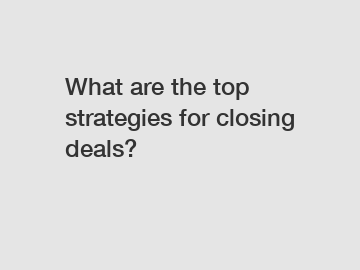What are the top strategies for closing deals?
Closing a deal is the ultimate goal for any salesperson. It's the moment when all the hard work, research, and relationship-building pays off. However, closing a deal isn't always easy. It requires a combination of skill, strategy, and persistence. In this blog post, we'll explore some of the top strategies for closing deals that successful salespeople use.
1. Build rapport and trust.
One of the most important strategies for closing deals is building rapport and trust with your potential clients. People are more likely to buy from someone they trust and like. Take the time to get to know your clients, their needs, and their pain points. Show them that you understand their challenges and that you have a solution that can help them. By building a strong relationship with your clients, you'll increase the likelihood of closing the deal.

2. Listen actively.
Active listening is a crucial skill for closing deals. Instead of focusing on what you're going to say next, take the time to really listen to your clients. Pay attention to their needs, concerns, and objections. By listening actively, you'll be able to tailor your pitch to address their specific concerns and demonstrate how your product or service can solve their problems. Active listening also shows your clients that you value their input, which can help build trust and rapport.
3. Offer solutions, not products.
Another key strategy for closing deals is to focus on offering solutions, not just products. Instead of simply listing the features of your product or service, show your clients how it can benefit them. Demonstrate how your solution can solve their problems, save them time or money, or help them achieve their goals. By framing your pitch in terms of the value you can provide, rather than just the features of your product, you'll make a stronger case for closing the deal.
4. Overcome objections.
Objections are a natural part of the sales process. Instead of avoiding or ignoring objections, successful salespeople address them head-on. When a client raises an objection, take the time to understand their concerns and address them honestly and thoughtfully. By acknowledging objections and offering solutions, you'll build trust with your clients and increase your chances of closing the deal. Remember, objections are an opportunity to demonstrate your expertise and problem-solving skills.
5. Create a sense of urgency.
Creating a sense of urgency is another effective strategy for closing deals. By creating a deadline or time-sensitive offer, you can encourage your clients to make a decision quickly. Limited-time promotions, discounts, or bonuses can help push clients towards closing the deal. Just be sure to create a sense of urgency ethically and honestly, and avoid using high-pressure sales tactics. By creating urgency, you can motivate your clients to act and increase your chances of closing the deal.
6. Follow up consistently.
Following up is a critical part of the sales process. Many deals are lost simply because the salesperson fails to follow up with the client. By staying in touch with your clients, you can build trust, address any concerns or objections, and keep the conversation moving forward. Be sure to follow up promptly after meetings or calls, and continue to check in regularly until the deal is closed. Consistent follow-up shows your clients that you're committed to helping them and can help you stay top of mind when they're ready to make a decision.
In conclusion, closing deals requires a combination of skill, strategy, and persistence. By building rapport and trust, listening actively, offering solutions, overcoming objections, creating urgency, and following up consistently, you can increase your chances of closing deals successfully. Remember, closing deals is ultimately about helping your clients solve their problems and achieve their goals. By focusing on providing value and building strong relationships, you can become a more effective and successful salesperson.
Are you interested in learning more about bop drilling equipment, annular bop how it works, blowout preventer manufacturers? Contact us today to secure an expert consultation!

Comments